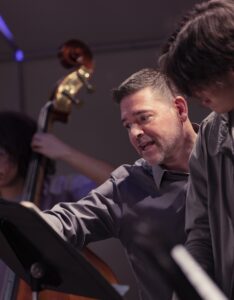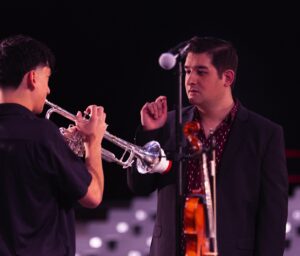Tagged Under:
When You’re the Only Music Teacher in the Building
You may feel alone, but you’re not. To survive and thrive, create your own team, set boundaries and just show up.
Have you sat in a staff meeting and realized that nobody in the room understands what you do all day? You must be the only music teacher in the building.
Maybe you’re running both band and choir. Maybe you’re directing the musical on top of general music and some other class because “you’re good with kids.” Either way, you’re probably balancing a full load with no back up. Sometimes, you just need someone else to say, “Yeah, this is too much.” Because it is.
I remember walking into a “team” meeting during my first year, only to realize that I wasn’t on a team. Not really. Everyone else taught English, math or history. They had department meetings. Curriculum alignments. Common planning time. I had a never-ending to-do list full of all the stuff I had agreed to do.

You’re Not Supposed to Know How to Do All This
When you’re the lone music teacher, everyone assumes you can do everything. Soundboard broken? You must know how to fix it. Choir needs shirts? You can design them, right? Assembly tomorrow? Can you teach 40 kids the alma mater in four parts by lunch?
At first, it feels good to be needed. I remember thinking, Sure, I can help with that, because it felt like I was being a team player and getting on people’s good side. But there’s a difference between being capable and being a catch-all.
One time, I was asked to help with a pep rally — not the performance part but literally setting up chairs and running the projector. I said yes. Then, the projector didn’t work, and the whole thing became my problem because I was “good with tech.” I’m not. I just know how to wiggle the HDMI cable and switch back and forth between inputs. (Although one time I did insert a flash drive the correct way on the first try. OK — I’ll stop bragging.)
I spent years saying yes to every “quick favor” because I thought that’s what committed teachers did. It took me way too long to realize that I was basically the arts department version of setting myself on fire to keep everyone else warm.
And that fire spread! Eventually, I realized I wasn’t building a program — I was just putting out fires and none of them were mine.
You’re not failing because you can’t do it all. You’re human. You were never meant to teach every discipline of music, run the theater program, troubleshoot the PA and be on standby to sub second period. You were hired to teach music, not to focus solely on the “and-all-other-duties-as-needed” part of your contract.

You Can Be a Department of One Without Being Alone
It’s lonely and weird. Sometimes you just want to ask someone if your warm-ups are applicable to the literature without having to explain what warm-ups are.
I used to keep questions like that to myself. I didn’t want to sound unsure — especially around people who already didn’t understand what I did. One day, I finally cracked and emailed a former classmate who also teaches music. We hadn’t talked in over a year. I literally wrote: “Hey, do your high brass sound like they’re struggling with a lip slur above a third space C?” About 15 minutes later, he responded: “Yep. Sounds like progress.”
That one email turned into a weekly check-in. Nothing formal — just trading audio clips, questions and “should-it-sound-like-this?” texts. It helped a lot.
Sometimes, I would be grading and would send a message like: “I think I just heard a clarinet bite into their reed.” His reply: “That’s the only problem with band being before lunch. Tell them to eat a sandwich instead next time.” That was it. But it made me laugh, and that was enough to make the next class feel more doable.
If your district has other music teachers, reach out. Start a monthly check-in even if it’s just to vent. No agenda, no clipboard. Just a space where you can ask, “Is it normal that I’m building a marching show and directing the musical at the same time?”
Not sure who to reach out to? Email the high school band or choir director across town. You’re not bothering them. Odds are, they want the same thing you do — someone who gets it. Someone who knows the ins and outs of what you do. If you don’t have anyone in town, search online and find someone. There are plenty of authors on the Yamaha education blog or just about any of the Yamaha “40 Under 40” music educators who would be more than willing to answer your questions!
The best conversations I’ve had usually start with: “Hey, quick question…” that turned into a full-blown text thread of shared stress. You don’t need a whole department — you just need one or two people who know what a good rehearsal plan looks like.

Stop Saying Yes Just Because You’re “the Music Person”
One of the hardest parts of being the only music teacher is how often you’re seen as “the flexible one.” You don’t have a department or standardized tests to administer. So, obviously you can just move your concert, right? Just cover this extra class. Just write a 5th-grade graduation song. Just combine your classes so we can use your room.
No.
Your program deserves the same protection as every other subject. If you have class time scheduled, use it.
I’ve lost count of how many times someone’s asked if I can “just scoot things around” so they can use the space for a guest speaker or testing overflow. It took me years, but now I say: “No, we’ll need to keep our scheduled class time.” Every time I say it, I expect push back. Sometimes I get it, but most of the time, people just say okay and move on.
And if they don’t? That doesn’t mean you were wrong to say no. It just means they were used to you saying yes.
If you already have three after-school events, it’s okay to say your plate is full. If the district decides to cancel music for a week to double up on literacy blocks, it’s okay to say something.
There’s a difference between being “supportive” and being invisible. This stuff only gets more complicated the longer you let it slide. The clearer your boundaries, the less people assume they can mess with your schedule.
Saying no doesn’t make you difficult. It keeps your program from falling apart. And nobody else is going to set those boundaries for you.

You Don’t Have to Do It All — Just the Stuff That Matters
When you’re running everything yourself, you must make cuts. Not because you don’t care, but because you physically can’t do it all.
You don’t need a marching show, three concerts, a pep band, choir festivals, the spring musical, solo and ensemble, a pops concert and a talent show. Especially because you’re also fixing instruments and chasing down field trip forms.
I’ve had years where I tried to do it all. It didn’t end well.
Half of it felt rushed, the kids were burned out, and I didn’t enjoy any of it. The one year I dropped the pops concert and alternated the solo ensemble contest to every other year? Everything got better. The kids still played great. The audience still came. Turns out nobody missed it. Not even a little.
One year, I didn’t conduct the musical. The world didn’t end. Nobody spray-painted “TRAITOR” on my door.
Pick what matters to you and your students and do those things well. Put the rest on a two- or three-year rotation. Or don’t do it at all. That’s not laziness — that’s strategy.
I’ve seen some of the best programs in the nation skip marching band entirely or rotate musicals. I’ve also seen programs that do it all, but they have a full staff, paid assistants and a budget big enough to support all their hopes and dreams!
Your program doesn’t need to look like anyone else’s. It just needs to be something you can sustain and something your students want to come back to.
If anyone’s confused about why you’re not doing “everything,” ask them when they last built four different performance calendars and taught eight preps.

You’re Not the Only One Even If You’re the Only One There
You’re not imagining it — it is harder when you’re the only teacher in the building. There’s no backup when you’re out. No team to bounce ideas off of. No one else who knows what it’s like to troubleshoot a reed emergency five minutes before performance time.
Remember, you don’t have to build your program in isolation. You can decide what to keep and what to cut. You can carve out time for what actually matters and stop apologizing for the rest. You can find your people, even if they’re not in your building. And, you can build something strong without doing it all yourself.
Some weeks, you may still feel like you’re barely holding things together. Remind yourself that the kids keep showing up. The music-making continues. Nobody’s grading you on how many hats you wear — and if they are, they can come wear one of yours for a day and see how it fits.
If no one has said this to you lately: You’re not behind. You’re not doing it wrong. You’re doing something incredibly hard and still showing up. And don’t forget: Even if you’re the only music teacher in your building, you’re not the only one doing this.















